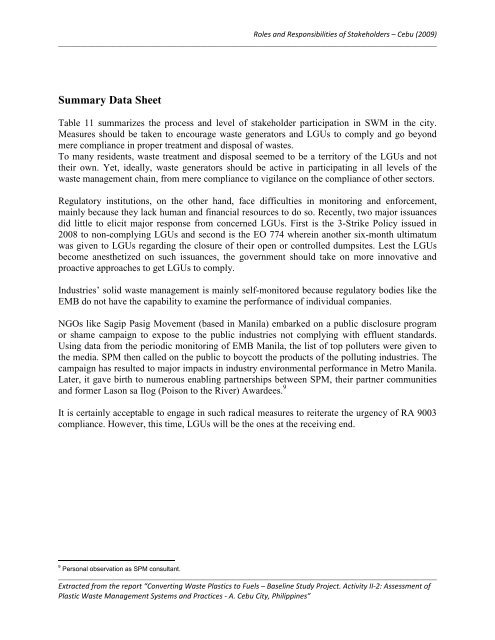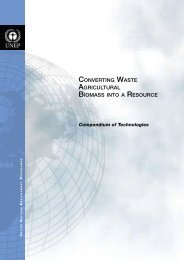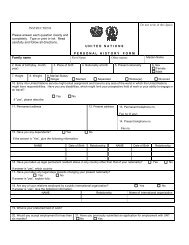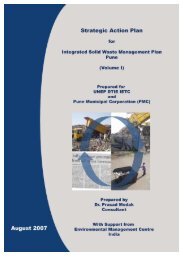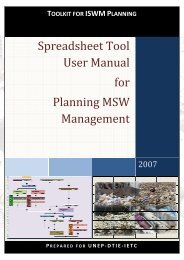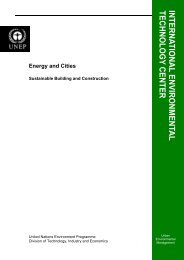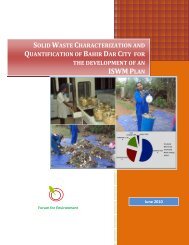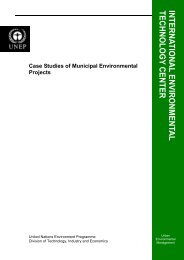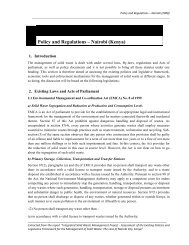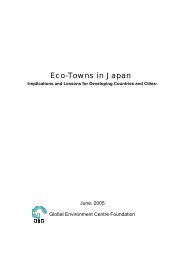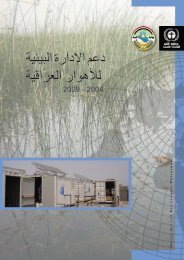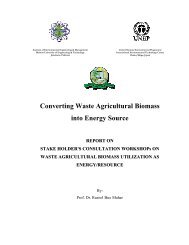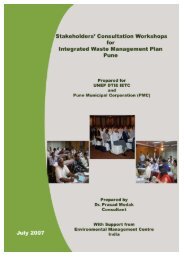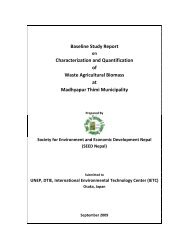Roles and Responsibilities of Stakeholders â Cebu ... - UNEP
Roles and Responsibilities of Stakeholders â Cebu ... - UNEP
Roles and Responsibilities of Stakeholders â Cebu ... - UNEP
Create successful ePaper yourself
Turn your PDF publications into a flip-book with our unique Google optimized e-Paper software.
<strong>Roles</strong> <strong>and</strong> <strong>Responsibilities</strong> <strong>of</strong> <strong>Stakeholders</strong> – <strong>Cebu</strong> (2009)<br />
________________________________________________________________________________________________________<br />
Summary Data Sheet<br />
Table 11 summarizes the process <strong>and</strong> level <strong>of</strong> stakeholder participation in SWM in the city.<br />
Measures should be taken to encourage waste generators <strong>and</strong> LGUs to comply <strong>and</strong> go beyond<br />
mere compliance in proper treatment <strong>and</strong> disposal <strong>of</strong> wastes.<br />
To many residents, waste treatment <strong>and</strong> disposal seemed to be a territory <strong>of</strong> the LGUs <strong>and</strong> not<br />
their own. Yet, ideally, waste generators should be active in participating in all levels <strong>of</strong> the<br />
waste management chain, from mere compliance to vigilance on the compliance <strong>of</strong> other sectors.<br />
Regulatory institutions, on the other h<strong>and</strong>, face difficulties in monitoring <strong>and</strong> enforcement,<br />
mainly because they lack human <strong>and</strong> financial resources to do so. Recently, two major issuances<br />
did little to elicit major response from concerned LGUs. First is the 3-Strike Policy issued in<br />
2008 to non-complying LGUs <strong>and</strong> second is the EO 774 wherein another six-month ultimatum<br />
was given to LGUs regarding the closure <strong>of</strong> their open or controlled dumpsites. Lest the LGUs<br />
become anesthetized on such issuances, the government should take on more innovative <strong>and</strong><br />
proactive approaches to get LGUs to comply.<br />
Industries’ solid waste management is mainly self-monitored because regulatory bodies like the<br />
EMB do not have the capability to examine the performance <strong>of</strong> individual companies.<br />
NGOs like Sagip Pasig Movement (based in Manila) embarked on a public disclosure program<br />
or shame campaign to expose to the public industries not complying with effluent st<strong>and</strong>ards.<br />
Using data from the periodic monitoring <strong>of</strong> EMB Manila, the list <strong>of</strong> top polluters were given to<br />
the media. SPM then called on the public to boycott the products <strong>of</strong> the polluting industries. The<br />
campaign has resulted to major impacts in industry environmental performance in Metro Manila.<br />
Later, it gave birth to numerous enabling partnerships between SPM, their partner communities<br />
<strong>and</strong> former Lason sa Ilog (Poison to the River) Awardees. 9<br />
It is certainly acceptable to engage in such radical measures to reiterate the urgency <strong>of</strong> RA 9003<br />
compliance. However, this time, LGUs will be the ones at the receiving end.<br />
9 Personal observation as SPM consultant.<br />
________________________________________________________________________________________________________<br />
Extracted from the report “Converting Waste Plastics to Fuels – Baseline Study Project. Activity II-2: Assessment <strong>of</strong><br />
Plastic Waste Management Systems <strong>and</strong> Practices - A. <strong>Cebu</strong> City, Philippines”


